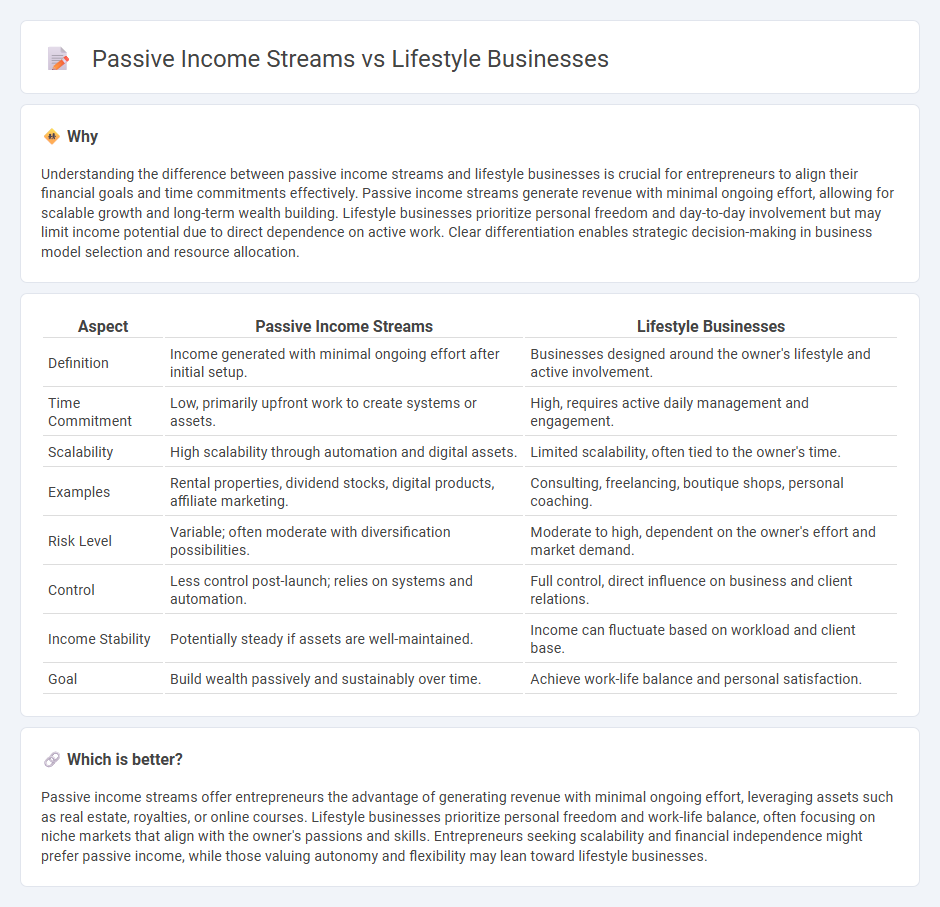
Passive income streams generate revenue with minimal ongoing effort, often through investments or automated online ventures, offering financial freedom and scalability. Lifestyle businesses focus on aligning work with personal passion and preferred living conditions, prioritizing satisfaction and flexibility over rapid expansion. Explore how each approach can shape your entrepreneurial journey and income goals.
Why it is important
Understanding the difference between passive income streams and lifestyle businesses is crucial for entrepreneurs to align their financial goals and time commitments effectively. Passive income streams generate revenue with minimal ongoing effort, allowing for scalable growth and long-term wealth building. Lifestyle businesses prioritize personal freedom and day-to-day involvement but may limit income potential due to direct dependence on active work. Clear differentiation enables strategic decision-making in business model selection and resource allocation.
Comparison Table
| Aspect | Passive Income Streams | Lifestyle Businesses |
|---|---|---|
| Definition | Income generated with minimal ongoing effort after initial setup. | Businesses designed around the owner's lifestyle and active involvement. |
| Time Commitment | Low, primarily upfront work to create systems or assets. | High, requires active daily management and engagement. |
| Scalability | High scalability through automation and digital assets. | Limited scalability, often tied to the owner's time. |
| Examples | Rental properties, dividend stocks, digital products, affiliate marketing. | Consulting, freelancing, boutique shops, personal coaching. |
| Risk Level | Variable; often moderate with diversification possibilities. | Moderate to high, dependent on the owner's effort and market demand. |
| Control | Less control post-launch; relies on systems and automation. | Full control, direct influence on business and client relations. |
| Income Stability | Potentially steady if assets are well-maintained. | Income can fluctuate based on workload and client base. |
| Goal | Build wealth passively and sustainably over time. | Achieve work-life balance and personal satisfaction. |
Which is better?
Passive income streams offer entrepreneurs the advantage of generating revenue with minimal ongoing effort, leveraging assets such as real estate, royalties, or online courses. Lifestyle businesses prioritize personal freedom and work-life balance, often focusing on niche markets that align with the owner's passions and skills. Entrepreneurs seeking scalability and financial independence might prefer passive income, while those valuing autonomy and flexibility may lean toward lifestyle businesses.
Connection
Passive income streams provide entrepreneurs with sustainable earnings that require minimal daily involvement, enabling them to focus on lifestyle businesses designed around personal interests and flexible work-life balance. Lifestyle businesses prioritize autonomy, often leveraging passive income sources such as royalties, affiliate marketing, or online courses to maintain steady cash flow without direct operational pressure. This synergy allows entrepreneurs to integrate financial stability with a lifestyle centered on freedom and creativity, essential principles in modern entrepreneurship.
Key Terms
Work-life balance
Lifestyle businesses prioritize flexible schedules and personal fulfillment, enabling entrepreneurs to integrate work seamlessly into their lives. Passive income streams generate revenue with minimal active involvement, offering financial freedom but often requiring significant upfront effort or investment. Explore the unique benefits and challenges of both to find the best approach to achieve your ideal work-life balance.
Scalability
Lifestyle businesses typically offer limited scalability as they rely heavily on the owner's active involvement and time, restricting growth potential. Passive income streams, such as investments, online courses, or automated e-commerce, provide scalable opportunities by generating revenue with minimal ongoing effort. Explore detailed strategies to maximize income scalability in both models.
Automation
Lifestyle businesses prioritize personal freedom and flexible work schedules by relying on automated systems for routine tasks, reducing direct involvement. Passive income streams leverage automation to generate revenue with minimal ongoing effort, often through investments, rental properties, or digital products. Explore effective automation strategies to optimize both lifestyle businesses and passive income generation.
Source and External Links
Lifestyle Business: Balancing Dreams With Real Life - A lifestyle business is designed primarily to sustain a particular level of income for its owner and supports a personal lifestyle, with examples including boutique agencies like creative marketing, urban design studios, and consultancy services such as legal practice and financial advisory firms.
Lifestyle Business Ideas for Entrepreneurial Success - Lifestyle businesses can include ecommerce ventures such as dropshipping, print-on-demand merchandise stores, and subscription box services, which allow entrepreneurs to start scalable and flexible businesses around their interests.
8 Lifestyle Business Ideas to Start in 2024 - Popular lifestyle business models include creating and selling digital products, freelancing or consulting, becoming an influencer, ecommerce businesses, SaaS products, membership sites, and blogging, typically allowing for low overhead and potential passive income.
 dowidth.com
dowidth.com